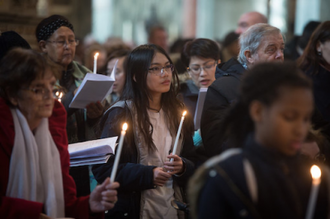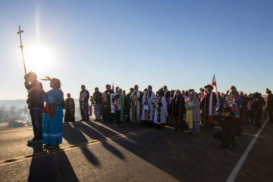Sick given pride of place at Our Lady of Lourdes Mass

image: CBCEW
Source: CBCEW
On Saturday 8th February, Cardinal Vincent Nichols presided at the annual Mass in honour of Our Lady of Lourdes, celebrated at Westminster Cathedral. During the Mass, which coincided with the World Day of Prayer for the Sick, the Sacrament of the Sick was administered to those who wished to receive it. The celebration was open to all, with a special invitation extended to the sick and infirm, hospital chaplains, doctors, nurses, healthcare assistants and all who work in healthcare. Bishops John Sherrington and Paul McAleenan concelebrated.
The Mass was also attended by current and former volunteers and pilgrims involved with the annual diocese of Westminster pilgrimage to Lourdes, which this year takes place from the 25th to the 31st of July. Young volunteers for the upcoming pilgrimage (known as 'redcaps' on account of their red uniforms) took part in the entrance procession, carrying a statue of Our Lady of Lourdes and the Diocese of Westminster pilgrimage banners along the Cathedral knave.
In his homily, Cardinal Vincent spoke about joy; the joy of the occasion, the Joys of Mary and the theme of joy as it appears in the Gospel story of the Wedding at Cana.
"Today we gather under the patronage of Our Lady of Lourdes. This is, therefore, a joyful occasion, as we honour her, sing our hymns to her, and bring to her our burdens, especially the burden of ill health. That is the gift of Lourdes, the great shrine for the sick. Indeed, our experience tells us that no one who visits Lourdes is likely to come away unchanged.
"In Lourdes, the sick are given pride of place. And that is so here, in the Cathedral today.
"Today's Gospel is one of the most familiar: the Wedding at Cana in Galilee. We can well imagine the range of emotions running through the scene: anticipation and excitement, a moment of panic, but then of relief that the embarrassment of running out of wine had been averted. The thread that runs through the Gospel passage is one of joy. Joy at a wedding; joy at, somehow, having the best of wine to enjoy; joy, above all in the presence of Our Lord and Our Blessed Lady.
"This sense of joy also links us to Our Blessed Lady and to our English heritage of Walsingham. The Joys of Mary, often seven in number, were important to medieval English Catholic devotion: the Annunciation, the birth of Our Lord, his miracles, the wonder of his death, the crowning of Mary in heaven and others. Her Joys are at the heart of the story of our faith. They are our Joys too."
The Cardinal also highlighted three distinct titles for Mary: Our Lady of Lourdes, Our Lady of Walsingham and Our Lady of Westminster.
'Today I want to put alongside this great title of Our Lady of Lourdes another wonderful title we give to her, for we can learn from both.
"Over by the confessionals is the statue of Our Lady of Westminster. It was probably carved in the mid fifteenth century, just a few decades after the reign of King Richard II. It was he who, in 1381, dedicated England to Our Lady in a ceremony at Westminster Abbey. Next month, we shall dedicate England afresh, as the 'Dowry of Mary.'
"'On 29th March, when we rededicate England as the 'Dowry of Mary', Our Lady doesn't need us to be building her houses, or writing her cheques. No - this is a dedication rooted in the faith of Catholics, her children, in our land. What we can offer to contribute to that 'dowry' will be different for each of us. For those of us who are sick, it might be our patience, our dependency on God and on our brothers and sisters. For healthcare workers, it may be your expertise … For all of us, this rededication is an occasion to offer faithful commitment to walk a Christian path, in ways appropriate to our own situations."
Read the full text of the Cardinal's homily below:
Today we gather under the patronage of Our Lady of Lourdes. This is, therefore, a joyful occasion, as we honour her, sing our hymns to her, and bring to her our burdens, especially the burden of ill health. That is the gift of Lourdes, the great shrine for the sick. Indeed, our experience tells us that no one who visits Lourdes is likely to come away unchanged. There new understanding opens up, new sensitivities emerge and new hope is born. In Lourdes, the mystery of suffering is unveiled in remarkable ways.
In Lourdes, the sick are given pride of place. And that is so here, in the Cathedral today. We come with our sick, helping those who are here in every possible way, and carrying in our hearts those who are not physically present. We come, in the words of Pope Francis, to Jesus, to 'his mercy and his comforting presence'. We come to the Church, 'the "inn" of the Good Samaritan who is Christ, that is, a home where we encounter his grace, which finds expression in closeness, acceptance and relief.'
Today I want to put alongside this great title of Our Lady of Lourdes another wonderful title we give to her, for we can learn from both.
Over by the confessionals is the statue of Our Lady of Westminster. It was probably carved in the mid fifteenth century, just a few decades after the reign of King Richard II. It was he who, in 1381, dedicated England to Our Lady in a ceremony at Westminster Abbey. Next month, we shall dedicate England afresh, as the 'Dowry of Mary'.
That term, 'Dowry of Mary', can seem a bit old fashioned. Traditionally, a dowry would be given, in money or goods, by a woman's family as she married, or entered religious life. In medieval England, it was often the other way round - a husband would make arrangements so that his wife would be provided for, even if she should become a widow. Many old estates have a 'Dower House' for just this purpose. That is the way to understand the title of England as the 'Dowry of Mary' - England as being set aside, in a special way, as a gift for Our Lady.
On 29 March, when we rededicate England as the 'Dowry of Mary', Our Lady doesn't need us to be building her houses, or writing her cheques. No - this is a dedication rooted in the faith of Catholics, her children, in our land. What we can offer to contribute to that 'dowry' will be different for each of us. For those of us who are sick, it might be our patience, our dependency on God and on our brothers and sisters. For healthcare workers, it may be your expertise as you 'make patients feel the presence of Christ, who cares for and consoles the sick, and heals every hurt.' For all of us, this rededication is an occasion to offer faithful commitment to walk a Christian path, in ways appropriate to our own situations. That might mean giving a renewed priority to prayer, or looking at our practical response to the Good News, or resisting the modern temptation to 'privatise' the practice of our Catholic Faith. So please do prepare well for this historic moment of re-dedication: Sunday 29 March.
Today's Gospel is one of the most familiar: the Wedding at Cana in Galilee. We can well imagine the range of emotions running through the scene: anticipation and excitement, a moment of panic, but then of relief that the embarrassment of running out of wine had been averted. The thread that runs through the Gospel passage is one of joy. Joy at a wedding; joy at, somehow, having the best of wine to enjoy; joy, above all in the presence of Our Lord and Our Blessed Lady.
This sense of joy also links us to Our Blessed Lady and to our English heritage of Walsingham. The Joys of Mary, often seven in number, were important to medieval English Catholic devotion: the Annunciation, the birth of Our Lord, his miracles, the wonder of his death, the crowning of Mary in heaven and others. Her Joys are at the heart of the story of our faith. They are our Joys too.
I hope and pray that the coming rededication of our country as the 'Dowry of Mary' may be a time when we can reflect on, and learn from, the joy of Our Blessed Lady and make it our own. Her interior joy was never for her own benefit alone. To bring that joy to a world that too often misses out on the joy of the Gospel; to be joyful in our everyday responsibilities as Christians; to be cheerful missionary disciples, whether in sickness or in health - these are the pathways of the joyful disciple.
Mary's instruction to the waiters at the wedding is her instruction to us too, on our pathway of life. To them she said 'Do whatever he tells you.' She says to same to us. Only then will all those difficult things in life, which can easily turn into bitter vinegar, become like wine, borne with dignity, a focal point of mutual care and a precious offering to our Blessed Lord.
May Our Lady's prayers help us on our way.
Our Lady of Lourdes, pray for us.
Our Lady of Walsingham, pray for us.
Our Lady of Westminster, pray for us.
Amen.


















